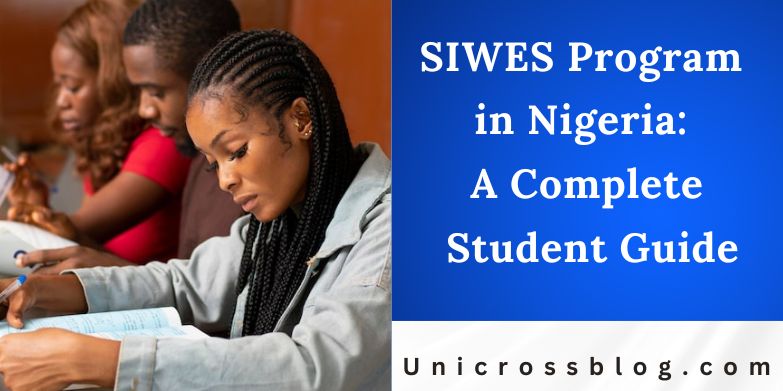The Student Industrial Work Experience Scheme (SIWES) is a vital program in Nigeria designed to bridge the gap between theoretical academic knowledge and practical industry experience. Initiated in 1973 by the Industrial Training Fund (ITF), SIWES aims to equip students in tertiary institutions with hands-on skills and real-world exposure in their chosen fields. This program is mandatory for students pursuing specific courses in universities, polytechnics, and colleges of education, particularly those in science, engineering, technology, and related disciplines. By participating in SIWES, students gain practical insights, develop professional competencies, and prepare for the demands of the workplace.
This guide provides a comprehensive overview of the SIWES program, detailing its objectives, eligibility criteria, duration, application process, and expectations.

What is SIWES?
SIWES is a structured training program that integrates classroom learning with practical industry experience. It is overseen by the Industrial Training Fund (ITF) in collaboration with tertiary institutions and industry partners. The program exposes students to workplace environments, allowing them to apply theoretical knowledge to real-life scenarios, operate industry-standard equipment, and develop professional skills.
The program is particularly relevant for students in disciplines such as engineering, technology, environmental sciences, agriculture, and applied sciences. It ensures students are better prepared for their careers by fostering technical proficiency, teamwork, problem-solving, and adaptability.
Objectives of SIWES
The SIWES program has several key objectives:
-
Practical Skill Acquisition: Provide students with hands-on experience in their field of study.
-
Industry Exposure: Familiarize students with workplace dynamics, professional ethics, and organizational culture.
-
Theory-Practice Integration: Enable students to apply theoretical knowledge to practical tasks.
-
Employability Enhancement: Equip students with skills that enhance their employability and career readiness.
-
Collaboration: Strengthen partnerships between educational institutions and industries for mutual benefit.
Eligibility and Participation
Who Can Participate?
SIWES is mandatory for students enrolled in specific programs at accredited tertiary institutions in Nigeria. Eligible students typically include those studying:
-
Engineering (e.g., civil, mechanical, electrical, chemical)
-
Technology (e.g., computer science, information technology)
-
Environmental sciences (e.g., architecture, urban planning)
-
Agriculture and related fields
-
Applied sciences (e.g., microbiology, biochemistry)
-
Other ITF-approved courses
Students must be in their second or third year of study (depending on the institution and program) to participate. For university students, SIWES is typically undertaken during the second semester of the third year (300 level) or the first semester of the fourth year (400 level). Polytechnic and college of education students usually participate during their National Diploma (ND) or Higher National Diploma (HND) programs.
Duration of SIWES
The duration of SIWES varies based on the institution and course of study:
-
University Students: 6 months (typically one semester).
-
Polytechnic Students: 3 to 6 months, depending on the program (ND or HND).
-
College of Education Students: 3 to 4 months, depending on the course.
The program is usually scheduled during the industrial training period designated by the institution.
Application and Placement Process
Step-by-Step Application Process
-
Institutional Registration: Students must register for SIWES through their institution’s SIWES or Industrial Training (IT) Unit. This involves completing necessary forms, such as the ITF Form 8 and the SIWES Job Specification Form.
-
Placement Search: Students are responsible for securing a placement in an organization relevant to their field of study. Institutions may provide a list of approved organizations or assist with placement, but students often need to contact companies directly.
-
Submission of Placement Letter: Once accepted by an organization, students submit a placement letter to their institution’s SIWES Unit and the ITF.
-
ITF Verification: The ITF verifies the placement to ensure the organization is suitable and aligned with the student’s course of study.
-
Orientation: Many institutions and the ITF conduct orientation programs to prepare students for the expectations and responsibilities of SIWES.
-
Commencement: Students begin their training at the designated organization, adhering to the organization’s rules and the SIWES guidelines.
Tips for Securing a Placement
-
Start Early: Begin contacting organizations well before the SIWES period to increase your chances of securing a spot.
-
Leverage Networks: Reach out to family, friends, or lecturers for recommendations or introductions to industry professionals.
-
Tailor Applications: Customize your application letter and CV to highlight your academic background and interest in the organization’s work.
-
Research Organizations: Target companies that align with your field of study and have a track record of hosting SIWES students.
-
Be Professional: Approach potential employers with professionalism, as first impressions matter.
Expectations During SIWES
Student Responsibilities
During the SIWES program, students are expected to:
-
Adhere to Workplace Rules: Follow the organization’s policies, including punctuality, dress code, and workplace ethics.
-
Maintain a Logbook: Record daily activities, tasks, and observations in a SIWES logbook, which must be signed by the industry supervisor weekly.
-
Engage Actively: Participate in assigned tasks, ask questions, and seek opportunities to learn.
-
Submit Reports: At the end of the program, submit a detailed SIWES report to the institution, summarizing the experience and lessons learned.
-
Attend Supervision Visits: Be available for visits by institutional and ITF supervisors who assess progress and ensure compliance.
Role of the Industry Supervisor
The industry supervisor, assigned by the host organization, guides the student throughout the program. Their responsibilities include:
-
Assigning relevant tasks and projects.
-
Monitoring the student’s progress and providing feedback.
-
Signing the student’s logbook weekly to verify activities.
-
Ensuring the student gains meaningful exposure to industry practices.
Role of the Institution and ITF
-
Institution: Coordinates the program, provides guidance, conducts supervision visits, and evaluates the student’s performance based on the logbook and report.
-
ITF: Oversees the program, verifies placements, provides funding for supervision allowances, and ensures compliance with SIWES guidelines.
Assessment and Grading
SIWES is a graded course in most institutions, contributing to a student’s overall academic performance. The assessment is based on:
-
Logbook (30-40%): Completeness, accuracy, and consistency of entries.
-
SIWES Report (30-40%): Quality of the written report, including structure, content, and relevance.
-
Supervisor’s Evaluation (20-30%): Feedback from the industry and institutional supervisors on the student’s performance.
-
Oral Presentation/Defense (0-10%): Some institutions require students to present their SIWES experience to a panel.
To excel, students should maintain a detailed logbook, submit a well-written report, and demonstrate professionalism throughout the program.
Benefits of SIWES
Participating in SIWES offers numerous advantages, including:
-
Practical Experience: Hands-on exposure to industry tools, processes, and challenges.
-
Career Clarity: Insight into career paths and specialization options.
-
Networking: Opportunities to build professional relationships with industry experts.
-
Skill Development: Enhanced technical, communication, and teamwork skills.
-
Employability: Improved job prospects, as many organizations prefer candidates with practical experience.
-
Academic Growth: Better understanding of theoretical concepts through practical application.
Challenges and Solutions
Common Challenges
-
Difficulty Securing Placement: Some students struggle to find organizations willing to accept them.
-
Lack of Supervision: In some cases, industry supervisors may be too busy to provide adequate guidance.
-
Financial Constraints: Students may face costs for transportation or accommodation, especially if placed far from home.
-
Relevance of Tasks: Some students are assigned tasks unrelated to their field of study.
Solutions
-
Start Early: Begin the placement search months in advance to secure a suitable organization.
-
Communicate: Discuss any issues with your institutional SIWES coordinator or ITF representative.
-
Budget Wisely: Plan for expenses and seek placements closer to your location if possible.
-
Be Proactive: Request relevant tasks from your supervisor and show initiative in learning.
READ ALSO: Differences Between SIWES, NYSC, and NPower
FAQs
Is SIWES mandatory for all students?
No, SIWES is mandatory only for students in specific programs, such as engineering, technology, and applied sciences, as approved by the ITF and their institution.
Can I choose any organization for SIWES?
The organization must be relevant to your field of study and approved by your institution and the ITF. It should have the capacity to provide meaningful training.
What happens if I don’t participate in SIWES?
SIWES is a compulsory course for eligible programs. Failure to participate may result in incomplete academic requirements, delaying graduation.
How do I write a good SIWES report?
A good SIWES report should include an introduction, objectives, details of the organization, tasks performed, challenges faced, lessons learned, and a conclusion. Use clear language, organize content logically, and follow your institution’s guidelines.
Does SIWES provide payment or stipends?
The ITF provides a stipend to students, typically paid after the program, subject to submission of required documents (e.g., logbook and report). Some organizations may also offer allowances, but this is not guaranteed.







